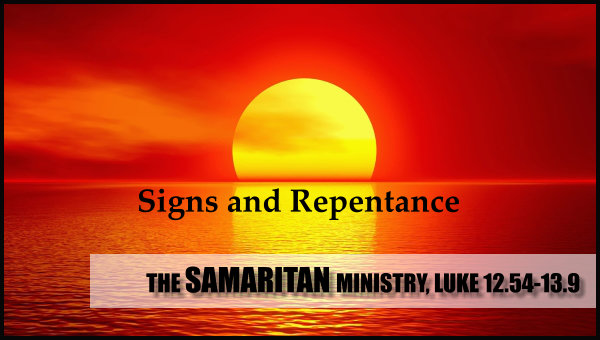By Tyson Thorne

The Samarian Ministry at Various Cities (9.51-18.34), 12.54-13.9
A few years ago I attended a “Word of Life” church, simply to experience it firsthand. It is far more charismatic than I’m comfortable with, and the preaching a bit more sensational than I’m used to, but I walked away with a new appreciation for my Baptist roots. Throughout the sermon people were yelling “Amen” and “preach it” and clapping for various points made by the pastor. At one point the preacher stopped, looked out over the audience and proclaimed, “I’m preaching a whole lot better than you’re applauding!” I’ve never heard a preacher self-aggrandize to such an extent.
Without any egotistic remarks, Jesus too chastised his audience on this occasion for not responding to his message about the Kingdom as they should have. After speaking to his disciples about how anxious he is to bring his Kingdom in its fullness, he turned to the crowds and scolded them for not understanding the signs they were being given. Here was the long awaited messiah, performing the signs and miracles they were told to look for, and so few had the understanding (or the faith) to see him for who he is. What is more, they didn’t recognize that for the first time since the fall of man, God was walking and living among them. The kingdom was in their presence!
I’ve thought about this passage a lot, and context makes it clear that this criticism was of the people in Jesus’ audience that day and not of the larger Kingdom community. Nevertheless, we should take note and make sure we can recognize the signs surrounding Jesus’ second coming. While it is out of scope in our study of Luke to examine those signs at this time (though we may do so later), hopefully Jesus-followers of this age will be more astute than those of the first.
Jesus will go on in this way for the remainder of the sermon, starting with a parable to help drive the point home. Just as they should use their judgment to determine the times, so to should they use proper judgment in their relationship with God. Like a man owing a great debt being dragged to court (indicating his time to repay is up), so too should everyone consider their connection with God before it is too late. Following the parable, he calls the people to repentance.
Calling one to repent necessitates that they have done wrong, that there is a need of repentance. The people in Jesus’ audience didn’t like such aspersions being cast on them, so they asked about a recent event. They told Jesus about some Galilean men who had gone to Jerusalem, presumably to make sacrifice at the temple. The Roman governor or Jerusalem, Pontius Pilate, had these men slain while they were sacrificing their animals. There is no other mention of this event in history, at least none that have yet come to light, but it would have been a reprehensible thing to do. Pagans entering the holy court and murdering Jews on a high holy day, and then to allow their blood to comingle with the sacrificial blood – well it was something that was unforgivable.
Just as in our time, when we hear of calamity such as a mall shooting or terrorist bombing, the people want someone to blame. Sometimes we blame the perpetrator, sometimes the victims (they probably deserved it somehow), and sometimes we blame God. Why did the crowd bring up this incident? To deflect their own need for repentance. “What about those Galileans? Was their sin so great that God smote them in the temple?” We can guess this is what was on their minds from the way Jesus answers the question: “Do you think these Galileans were worse sinners…?” Jesus makes a divine judgment on the matter, “No, I tell you!” What is Jesus doing? He’s putting the focus right back on the listener.
Jesus raises a second example, one which has historic corroboration, about the tower of Siloam which fell and killed 18 Jews. Again, in the case of natural disasters, people like someone to blame. Jesus doesn’t play the blame game with them. “Do you suppose they were greater offenders than all those who live in Jerusalem?” Death will come to all people and at that time it will be too late to repent. “Unless you repent, you will all perish as well,” Jesus tells them.
It is easy to mistake the point of the passage to be about sin, however, it is clear that the focus is on repentance. This is made clear in the next parable Jesus tells about the fig tree. After three years of bearing no fruit, the landowner instructs the gardener to cut it down. The gardener buys the tree more time, offering to take special care of it and see if it then produces figs. The truth Jesus wants us to understand is that the unrepentant are judged, and likewise those who claim to follow Jesus but are not changed will also be judged. It is right that we repent and change how we live so that we avoid judgment.
What we learn is that whether through death or the return of Jesus our time to repent is limited. A call to repentance is something the living hate to hear, and is something those who have been judged wish they could hear one more time.
|
|
